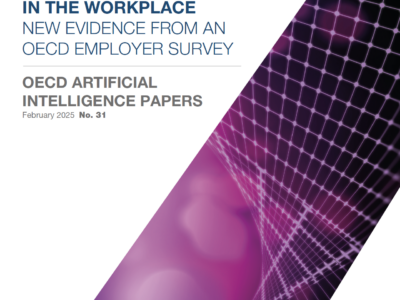The OECD programme on AI in Work, Innovation, Productivity and Skills (AI-WIPS) - with the support of Germany – analyses the impact of AI on the labour market, skills and social policy.
Labour markets
AI is likely to have a significant impact on the world of work, acting as a substitute to human labour in some tasks, and as a complement in others. It will give rise to entirely new tasks and occupations and potentially change drastically the nature of others. Some tasks and jobs will become safer and less monotonous as a result of the adoption of AI, while others may be at risk of de-humanisation or de-skilling. This OECD work stream focuses on:
- What do we know about the impact of AI on the labour market
- An assessment of what happens to occupations most exposed to AI
- The role of social partners in the adoption of AI
- The ethical implications of AI adoption in the workplace
- The impact of AI on job matching
- The impact of AI on job quality and skills use
Expert interviews on AI and the labour market
The videos below are a series of interviews with experts in AI and the labour market. Find out more about each expert in their bios below:
| Dr. Karin Kimbrough, Chief Economist at LinkedIn, explains how big data can be used to provide new insights into changing skills needs, and what skills young people should invest in if AI become a widely-used technology in the labour market. |  |
| Prof. Wim Naudé, University College Cork, Ireland, talks about the AI “hype”, the ongoing barriers to AI diffusion, and how public procurement may be used to promote the faster diffusion of more ethical, human-centred AI. |  |
| Prof. Gina Neff, Oxford Internet Institute, United Kingdom, discusses some of the risks for workers when AI is adopted by companies, her concerns around AI-based tracking technologies, and the value that society places on the “data work” that goes into building AI. |  |
| Prof. Isamu Yamamoto, Keio University, Japan, shares findings from a survey he has carried out on the impact of AI in the workplace in Japan, and what it means for different skills groups. |  |
| Dr. Salima Benhamou, France Stratégie, France, shares her vision on the impact of AI on the labor market and skills, and the most suitable work organisation methods to promote the complementarity between AI and human intelligence. |  |
Videos
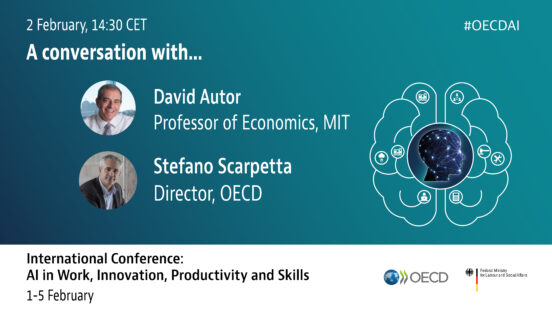
Conversation with David Autor
–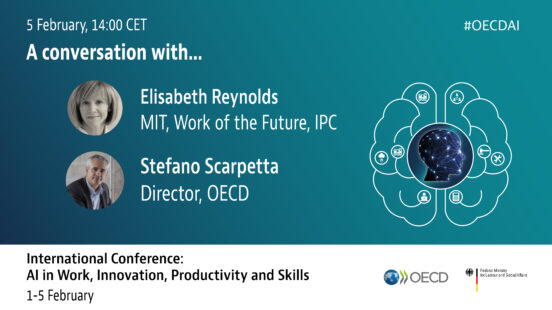
Conversation with Liz Reynolds
–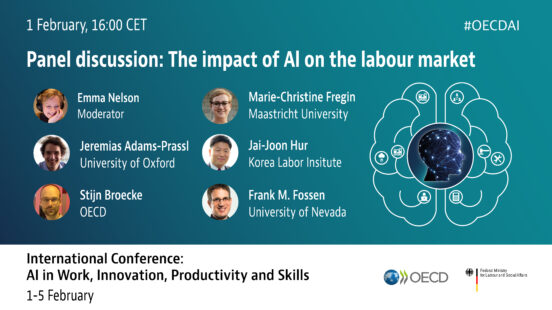
The impact of Al on the labour market
–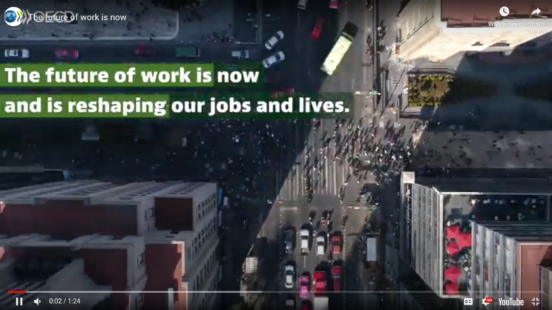
The future of work is now
–
AI for labour market matching
–
Discrimination and AI in the workplace
–Publications
Algorithmic management in the workplace: New evidence from an OECD employer survey
The survey offers unprecedented insights into the prevalence of algorithmic management, its perceived impacts and firm-level measures to govern its use. The findings show that algorithmic management tools are already commonly used in most countries s...
Artificial intelligence and labour market matching
While still in its infancy, Artificial Intelligence (AI) is increasingly used in labour market matching, whether by private recruiters, public and private employment services, or online jobs boards and platforms. Applications range from writing job d...
Artificial Intelligence and Employment – New Evidence from Occupations Most Exposed to AI
In recent years, Artificial Intelligence (AI) has made significant progress in areas like information ordering, memorisation, perceptual speed, and deductive reasoning – all of which are related to non-routine, cognitive tasks. As a result, the occup...
Artificial intelligence and employment: New cross-country evidence
Recent years have seen impressive advances in artificial intelligence (AI) and this has stoked renewed concern about the impact of technological progress on the labour market, including on worker displacement. This paper looks at the possible links b...
The human capital behind AI: Jobs and skills demand from online job postings
Building on recent OECD work, this paper analyses the skills sets (“skills bundles”) demanded in artificial intelligence (AI)-related online job postings. The analysis uses Burning Glass Technologies’ data for the United States and the United Kingdom...
Demand for AI Skills in Jobs: Evidence from online job postings
This report presents new evidence about occupations requiring artificial intelligence (AI)-related competencies, based on online job posting data and previous work on identifying and measuring developments in AI. It finds that the total number of AI-...
The impact of Artificial Intelligence on the labour market: What do we know so far?
This literature review takes stock of what is known about the impact of artificial intelligence on the labour market, including the impact on employment and wages, how AI will transform jobs and skill needs, and the impact on the work environment. Th...
Automation, skills use and training
This study focuses on the risk of automation and its interaction with training and the use of skills at work. Building on the expert assessment carried out by Carl Frey and Michael Osborne in 2013, the paper estimates the risk of automation for indiv...


























